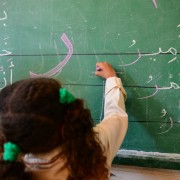Speeches Shim
Solving structural and youth unemployment requires innovative and diverse solutions. USAID seeks to increase employability by providing innovative and affordable learning solutions for skills development, in order to help reduce youth unemployment, promote entrepreneurship, and potentially increase industrial productivity.

Youth unemployment is not unique to Morocco. Worldwide, young people are two or three times more likely to be out of work than their parents. Morocco fits this pattern with an overall unemployment rate of 10 percent, with youth (15-29 years old) being twice as likely to be without a job. This cadre of young people, who make up approximately one third of Morocco’s total population of 35 million, represents a pool of untapped talent not contributing to economic productivity. Ironically, the more educated youth become, the more likely they are to be unemployed. Morocco is currently creating less than 50 percent of the new jobs required to keep up with the growing working age population: every year, the job market is gaining 240,000 new entrants each year while only 129,000 new jobs are being created. As a result, USAID and the Government of Morocco share youth employability as a top priority for national policy and economic growth.

Community policing is both a philosophy and an organizational strategy that emphasizes partnership and collaboration between police and the communities that they serve with the objective of identifying and jointly responding to problems of crime, disorder, and fear of victimization. USAID supports the Kingdom of Morocco’s reform efforts through a community policing pilot project in designated marginalized neighborhoods in Tangier and Tetouan.

Young Moroccans constitute over 10 million of the 35 million total population and 80 percent of the unemployed in the country. Surprisingly, unemployment rates rise sharply by educational attainment – ranging from just 4.7 percent for labor force participants with no education to over 23 percent for university graduates. While job growth cannot keep pace with youth entering the job market, many graduates also lack the ability to communicate effectively with employers and find jobs commensurate with their education. At the same time, employers complain of skills shortages and mismatches. Without career guidance in higher and vocational education institutions, youth lose the opportunity to make informed choices about career trajectories, with minimal prospects for advancement.

A lack of education perpetuates poverty, limits job opportunities, and strains the overall social support system. USAID is working in close partnership with the Ministry of Education to support their ambitious reform efforts by developing an evidence base to design activities that improve reading skills of Moroccan primary school students.


Comment
Make a general inquiry or suggest an improvement.